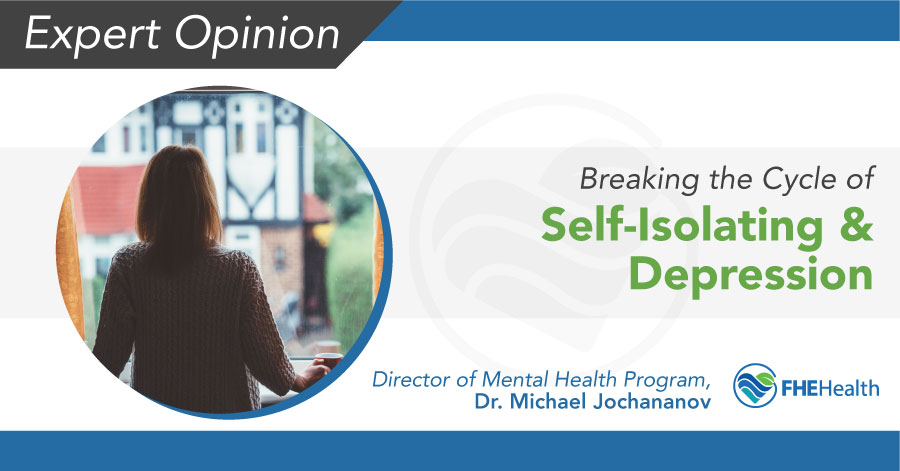
This article has been reviewed for accuracy by our peer review team which includes clinicians and medical professionals. Learn more about our peer review process.
Updated September 19, 2023
Table of Contents
- Reasons People Self-Isolate
- Practical Tips for Breaking the Cycle of Self-Isolating and Depression
- How a Therapist Can Help Address Depression and Self-Isolating Tendencies
- How to Know When to Seek Help During the Social Distancing Era
- How to Help a Loved One in the Cycle of Self-Isolation and Depression
Self-isolation often co-occurs with depression: It is both a cause and a symptom of this common and very treatable mental health condition. It’s also why clinicians often talk about a self-perpetuating “cycle” of isolating and depression. Depression typically causes a person to socially isolate; self-imposed isolation exacerbates the existing depression, which only further encourages self-isolation (and that in turn amps up the depression).
The resulting feedback loop can seem impossible to break, especially when you’re stuck right in the middle of it. Just ask Dr. Michael Jochananov (also affectionately called “Dr. J”). He’s Director of FHE Health’s Mental Health Program. In a recent interview, he shared his insights into the isolation cycle of depression and anxiety, as well as tips for how to break it….
Reasons People Self-Isolate
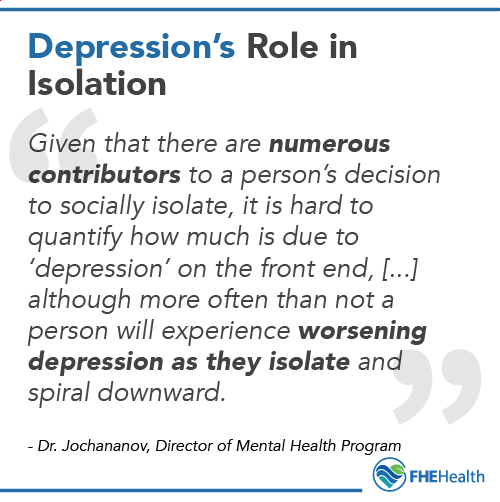
Depression is one explanation for why people choose to self-isolate, according to Dr. J. People self-isolate for these reasons as well:
- “being embarrassed”
- “not feeling understood, or feeling different or disconnected from others”
- “feelings of worthlessness, self-doubt, and helplessness”
- “prominent fear and anxiety (phobia) or stress”
- and, “although a person can choose to isolate themselves from others, society often inflicts isolation on people suffering with mental illness.”
It’s also not unusual for more than one of these factors to be at play simultaneously (whether or not depression specifically is in the equation).
“Given that there are numerous contributors to a person’s decision to socially isolate, it is hard to quantify how much is due to ‘depression’ on the front end,” Dr. J. said, “although more often than not a person will experience worsening depression as they isolate and spiral downward.”
Dynamics of Self-Isolating and Self-Inflicted Depression
What, then, are the dynamics of self-isolating and depression, and how do they create an unhealthy feedback loop? Dr. J. described it as follows:
Social withdrawal is one of the most common and telling signs of depression. Depression often leads people to isolate themselves, often due to the multiple factors that are contributing to their depression—feeling lonely, feelings of rejection, poor self-worth, rejection, self-doubt, loss, etc … Depression can become a feedback loop when isolating leads people to feel lonely, and the more a person feels alone the more depressed they can get. Isolation worsens the symptoms of depression and can result in a downward spiral.
Is Self-Isolation A Form of Depression?
As for whether or not self-isolation is a form of depression, Dr. J. explained that someone struggling with depression “may feel like an outcast” and “behave in ways to avoid social situations.” When friends and family go along with and, in essence, enable these self-isolating tendencies, they can end up unwittingly reinforcing their loved one’s self-narrative (that they don’t belong, aren’t good-enough company, etc.).
Practical Tips for Breaking the Cycle of Self-Isolating and Depression
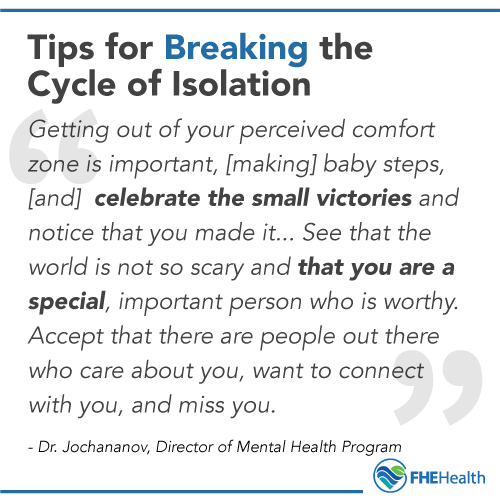 Thankfully, there are things people can do to break the cycle of self-isolating and depression, starting with “a concerted effort to reconnect with others.” Dr. J. was quick to acknowledge that “this sounds easy but can be hard and paralyzing for those suffering.” Still, he offered the reassurance that with “reasonable individual goals,” connecting with others is doable. He recommended making a list of all “the people in your life you want to reconnect with,” then choosing how you’ll connect: “In this day and age, you can connect via numerous platforms, text, email, videoconferencing, any social apps, or G-d forbid, talk on the phone or actually meet someone out in public.”
Thankfully, there are things people can do to break the cycle of self-isolating and depression, starting with “a concerted effort to reconnect with others.” Dr. J. was quick to acknowledge that “this sounds easy but can be hard and paralyzing for those suffering.” Still, he offered the reassurance that with “reasonable individual goals,” connecting with others is doable. He recommended making a list of all “the people in your life you want to reconnect with,” then choosing how you’ll connect: “In this day and age, you can connect via numerous platforms, text, email, videoconferencing, any social apps, or G-d forbid, talk on the phone or actually meet someone out in public.”
This process can feel uncomfortable, but “getting out of your perceived comfort zone is important,” according to Dr. J. He suggested making “baby steps,” if necessary. Also, “celebrate the small victories and notice that you made it and your head didn’t explode. See that the world is not so scary and that you are a special, important person who is worthy. Accept that there are people out there who care about you, want to connect with you, and miss you.”
How a Therapist Can Help Address Depression and Self-Isolating Tendencies
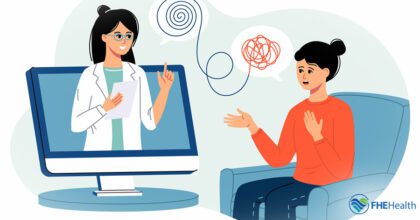
There are also key benefits to seeing a therapist for help with depression and self-isolating tendencies—for example, if the above tips don’t seem to work on their own. Dr. J. said that “a good therapist can help you cope with feelings, problem-solve, and change behaviors that may contribute to your symptoms.”
Here are some other ways that consulting a therapist can address the cycle of depression and self-isolation:
- “Going to see a professional takes away the fear that you will be judged.”
- “You have an invested and impartial person dedicated to helping you live a happy and fulfilling life.”
- “You will be able to explore how your thoughts, feelings, behaviors, and environment all interact and contribute to your mood and world view.”
- “You can find out you are not alone—that many people have similar shared experiences and worldviews.”
Feeling Ashamed to Ask for Help
These benefits of individual therapy notwithstanding, many people feel ashamed to ask for help. For these readers, Dr. J. offered the following words of encouragement: “Even heroes need help. We all get sad, depressed, nervous, and unsure. The sure way for things to not only stay the same but get worse is by not trying. We are all struggling. The worst thing that will happen is nothing will change—but you won’t get worse.”
How to Know When to Seek Help During the Social Distancing Era
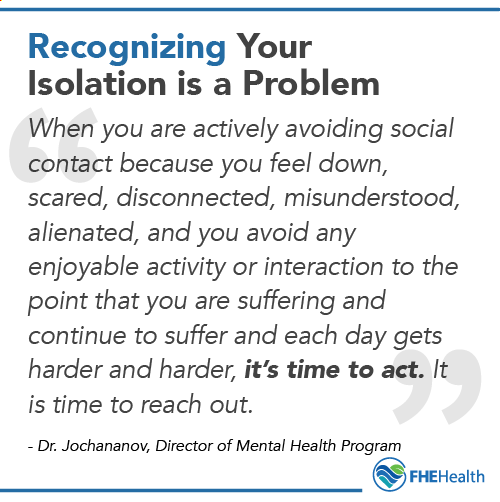 Recognizing and responding to a cycle of social isolation and depression can be complicated by a context in which social distancing and isolation are the prescribed social norm. On this note, what signs can people watch for to help them determine whether they may be self-isolating and/or depressed and could benefit from seeking help?
Recognizing and responding to a cycle of social isolation and depression can be complicated by a context in which social distancing and isolation are the prescribed social norm. On this note, what signs can people watch for to help them determine whether they may be self-isolating and/or depressed and could benefit from seeking help?
Dr. J. said a good litmus test is to ask yourself whether you’re still actively seeking out opportunities for social connection, even if only virtual. If you’re trying to connect socially with friends and family, via virtual happy hours and Zoom calls, then any social isolation you’re practicing is likely not self-imposed and you’re just “following the current social norm.”
On the other hand, “when you are actively avoiding social contact because you feel down, scared, disconnected, misunderstood, alienated, and you avoid any enjoyable activity or interaction to the point that you are suffering and continue to suffer and each day gets harder and harder, it’s time to act. It is time to reach out.”
Not reaching out only allows the physical and emotional cycle of isolation and depression to progress further. “Being socially withdrawn intensifies the brain’s stress response, leading to numerous, negative physiological and emotional symptoms and results,” Dr. J. said.
How to Help a Loved One in the Cycle of Self-Isolation and Depression

Dr. J. also had some words for families impacted by depression. He said family members can help a loved one suffering from self-isolating depression by inviting them to social gatherings and paying attention to how they respond to these invitations. If their loved one gives vague excuses and tends to engage in a pattern of avoiding social events, their loved one may be exhibiting a common behavior among people with depression and anxiety.
“Often it is up to loved ones to take the initiative and not simply accept that ‘Johnny’ is just that way and never wants to do anything,” Dr. J. said. He added that “as a community, we need to be less individualistic and more socially conscious,” especially “in today’s world of electronics and social media” when “it’s easier for people to fall through the cracks and not be noticed.”
“Simply reciting memes from the Internet is not going to cut it … We have to make a greater effort for each other, even if it’s inconvenient—and often even a small gesture can go a long way.”






